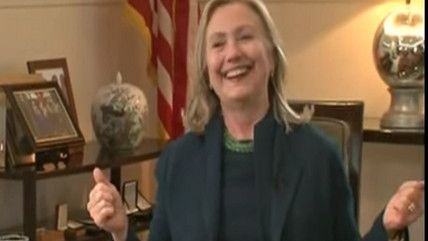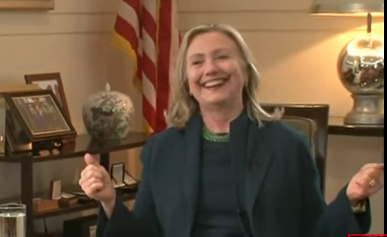Libyans Would Have Preferred Hillary Clinton Kept Her 'Smart Power' Away From Their Country
Five years after the fall of Gaddafi, some Libyans say life was better under dictatorship than the current chaos.


It's been five years since Libyan dictator Muammar Gaddafi was killed by rebels supported by NATO forces. Since that time, Libya has descended into civil war, with two governments in two cities both claiming legitimacy, ISIS controls significant amounts of oil and territory, and the country is generally considered a failed state.
While Gaddafi was a monstrous despot who ruled for over four decades, AFP reports that a winking nostalgia for the late colonel has emerged in the capital city of Tripoli:
Those living in the capital say they are exhausted by power cuts, price hikes and a lack of cash flow as rival authorities and militias battle for control of the fragmented oil-rich country.
"I hate to say it but our life was better under the previous regime," says Fayza al-Naas, a 42-year-old pharmacist, referring to Kadhafi's more than four decades of rule.
Today, "we wait for hours outside banks to beg cashiers to give us some of our own money. Everything is three times more expensive."
When news broke of Gaddafi's demise, Hillary Clinton was caught on a hot mic prior to an interview with CBS News. Then-Secretary of State Clinton pumped her fists and exclaimed, "We came. We saw. He died!" Despite the fact that the country is torn between what one analyst described to AFP as "chaos with militias and Islamist extremists as the dominant forces, or military rule," little has changed Clinton's rosy assessment of post-Gaddafi Libya.
It was only last month that Hillary Clinton defended her forceful support of U.S. intervention in Libya on the grounds that it averted a civil war. While such cognitive dissonance isn't quite the attention-grabber that Gary Johnson's notorious "What is Aleppo?" gaffe was, it is a remarkable thing for the current presidential front-runner to insist that the obviously short-sighted intervention—which directly led to an ongoing civil war and which President Obama describes as his greatest foreign policy regret—remains an example of "smart power at its best."
This is especially the case when you consider that the whole pretext for the intervention, ostensibly to stop a "slaughter" of civilians, was based on "erroneous assumptions and an incomplete understanding of the evidence," according to a scathing report (little reported in the U.S. media) issued by the U.K. Parliament last month. Much as during the run-up to war with Iraq, U.K. and U.S. government officials cherry-picked information to justify the use of force and had no plan for how to help stabilize the country after the dictator's fall.
Supporters of Hillary Clinton frequently claim that no other candidate for president has ever been as "qualified," citing her years as First Lady of both the U.S. and Arkansas, as well as her eight years in the Senate and four in the State Department, as unimpeachable demonstrations of her competence and judgment. And while Clinton may "regret" her support for the war in Iraq—it may well have cost her the Democratic presidential nomination in 2008, after all—when it comes to Libya, she appears to believe that "smart power" means never having to say you're sorry.


Show Comments (70)